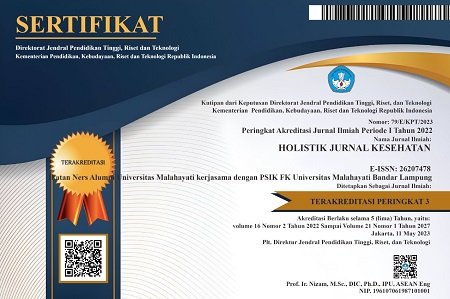Efektifitas precede-proceed model dalam meningkatkan kualitas hidup pasien penyakit kronis
Abstract
Background: Increasing cases of chronic diseases lead to higher death rates in the world. Chronic diseases are caused by unhealthy people's behaviour, environmental factors, increased use of technology, socio-cultural influences that can affect the quality of life of sufferers. Chronic illness can affect the health of individuals, families, communities and governments. The precede-proceed model is an approach that can be used to influence individuals in their activities by adjusting to their conditions, compliance with treatment and enthusiasm for treatment so as to improve the quality of life for people with chronic diseases.
Purpose: To identify the effectiveness of the precede-proceed model in improving the quality of life of patients with chronic diseases.
Method: This research is a pre-experimental research with a pre-test and post-test design approach. The population in this study were people with chronic diseases and the sample was 17 respondents who were selected by random sampling with the inclusion and exclusion criteria set by the researcher. The precede-proceed model was carried out in 7 stages which lasted for 7 weeks. The instrument used to assess the patient's quality of life is Whoqol-Brief. Hypothesis testing using the Paired T-sample statistic.
Results: the most dominant sex in this study was women with a percentage of reaching (76.47%), the most age was elderly with a percentage of 52.94%, secondary education level with the highest percentage of 58.82% and the most type of DM disease dominant in this study with a percentage of 35.29%. The precede-proceed model can improve the quality of life of patients with chronic diseases (p=0.00).
Conclusion: The precede-proceed model is an approach to increasing the knowledge of people with chronic diseases with health services through the support of patients, families and the community.
Keywords: Chronic Diseases; Precede-Proceed Model; Quality of Life.
Pendahuluan: Peningkatan kasus penyakit kronis menyebabkan semakin tingginya angka kematian di dunia. Penyakit kronis disebabkan perilaku masyarakat, faktor lingkungan, peningkatan penggunaan teknologi, pengaruh sosial budaya yang dapat mempengaruhi kualitas hidup penderita. Penyakit kronis dapat mempengaruhi kesehatan individu, keluarga serta masyarakat dan pemerintahan. Precede-proceed model merupakan suatu pendekatan dalam bentuk pendekatan, yang dapat mempengaruhi individu untuk beraktivitas dengan menyesuaikan dengan kondisinya, pemenuhan dalam pengobatan dan semangat dalam menjalani pengobatan sehingga mampu meningkatkan kualitas hidup penderita penyakit kronis.
Tujuan: Untuk melihat keefektifan precede-proceed model dalam meningkatkan kualitas hidup penderita dengan penyakit kronis.
Metode: Penelitian quasi eksperimen dengan pendekatan pre-test dan post-test design. Populasi dalam penelitian ini adalah penderita penyakit kronis, dengan sampel sebanyak 17 responden yang dipilih secara random sampling. Kriteria inklusi meliputi responden yang bersedia menjadi responden, pasien yang mengalami penyakit kronis lebih dari 6 bulan, kesadaran compos mentis, nilai kualitas hidupnya rendah, sedangkan yang menjadi kriteria eksklusi merupakan responden yang tidak bersedia menjadi responden, ada gangguan penglihatan dan pendengaran. Pelaksanaan precede-proceed model ini dilaksanakan dalam 7 tahapan yang berlangsung selama 7 minggu. Instrumen yang digunakan untuk menilai kualitas hidup pasien berupa Whoqol-Brief. Pengujian hipotesis menggunakan statistik Paired sampel T-test.
Hasil: Menunjukkan bahwa jenis kelamin yang paling dominan dalam penelitian ini adalah perempuan dengan persentase mencapai 76.47%, usia yang paling dominan dalam penelitian ini adalah lanjut usia dengan persentase mencapai 52.94%, tingkat pendidikan paling banyak menengah dengan persentase 58.82% dan jenis penyakit kronis yang paling banyak adalah penyakit diabetes mellitus dengan persentase 35.29%. Model precede-proceed dapat meningkatkan kualitas hidup penderita dengan penyakit kronis (p=0.00).
Simpulan: Precede-proceed model merupakan suatu pendekatan dalam meningkatkan pengetahuan penderita penyakit kronis dengan pelayanan kesehatan melalui dukungan dari pasien, keluarga dan masyarakat
Kata Kunci: Kualitas Hidup; Penyakit Kronis; Precede Proceed Model.
Keywords
References
Afiani, N., Qodir, A., Soelistyoningsih, D., & Daramatasia, W. (2021). Implementasi Model Precede-Proceed dalam promosi kesehatan untuk pencegahan hipertensi. The 4th Conference on Innovation and Application of Science and Technology (CIASTECH 2021, Ciastech, 637–644.
Arab-Zozani, M., Hashemi, F., Safari, H., Yousefi, M., & Ameri, H. (2020). Health-related quality of life and its associated factors in COVID-19 patients. Osong public health and research perspectives, 11(5), 296-302.
Arania, R., Triwahyuni, T., Esfandiari, F., & Nugraha, F. R. (2021). Hubungan Antara Usia, Jenis Kelamin, Dan Tingkat Pendidikan Dengan Kejadian Diabetes Mellitus Di Klinik Mardi Waluyo Lampung Tengah. Jurnal Medika Malahayati, 5(3), 146–153. https://doi.org/10.33024/jmm.v5i3.4200
Australian Institute of Health and Welfare. (2023). Chronic disease reports. Diakses dari: https://www.aihw.gov.au/reports-data/health-conditions-disability-deaths/chronic-disease/overview.
Bammann, K., Recke, C., Albrecht, B. M., Stalling, I., & Doerwald, F. (2021). Promoting Physical Activity Among Older Adults Using Community-Based Participatory Research with an Adapted PRECEDE-PROCEED Model Approach: The AEQUIPA/OUTDOOR ACTIVE Project. American Journal of Health Promotion, 35(3), 409–420. https://doi.org/10.1177/0890117120974876
Budiono, N. D. P., & Rivai, A. (2021). Faktor-faktor yang mempengaruhi kualitas hidup lansia. Jurnal Ilmiah Kesehatan Sandi Husada, 10(2), 371–379. https://doi.org/10.35816/jiskh.v10i2.621
Candrawati, S. A. K., & Sukraandini, N. K. (2022). Kecemasan Lansia dengan Kondisi Penyakit Kronis. Jurnal Akademika Baiturrahim Jambi, 11(2), 348. https://doi.org/10.36565/jab.v11i2.631
Chaboksavar, F., Azar, F. E. F., Solhi, M., & Azadi, N. A. (2021). Combination of self-management theory with precede–proceed model to promote life quality in patients with hypertension. Journal of Public Health, 29, 1401-1410.
Desriani, D., & Sastiono, P. (2022). Dampak Penyakit Kronis Terhadap Peluang Terjadinya Kerentanan Pada Rumah Tangga Di Indonesia. Jurnal Ilmiah Edunomika, 7(1).
Destriande, I. M., Faridah, I., Oktania, K., & Rahman, S. (2021). Faktor Yang Mempengaruhi Kualitas Hidup Pada Lanjut Usia. PSIKOWIPA (Psikologi Wijaya Putra), 2(1), 1–9. https://doi.org/10.38156/psikowipa.v2i1.41
Dewiyuliana, D., & Syah, A. Y. (2022). “CERDIK” Healthy Lifestyle for Reducing Complications of Diabetes Mellitus. Interest : Jurnal Ilmu Kesehatan, 11(1), 117–125. https://doi.org/10.37341/interest.v0i0.487
Dewiyuliana, D., Warsini, S., & Effendy, C. (2019). Patients’ and Nurses’ Perceptions of Palliative Care Outcomes: a Comparative Study. Belitung Nursing Journal, 5(2), 92–101. https://doi.org/10.33546/bnj.650
Dihni, V. A. (2022). Ini Penyakit Kronis yang Banyak Diderita Lansia Indonesia. Pergemi, 2022. https://databoks.katadata.co.id/datapublish/2022/05/30/ini-penyakit-kronis-yang-banyak-diderita-lansia-indonesia.
Guevarra, J. P., Peden, A. E., & Franklin, R. C. (2021). Application of the precede-proceed model in the development of evidence-informed interventions for drowning prevention: A mixed-methods study protocol. BMJ Open, 11(7), 1–10. https://doi.org/10.1136/bmjopen-2021-050688
Hosseini, Z., Homayuni, A., & Ghanbarnejad, A. (2022). Determinants of stress coping behaviors in patients with Multiple Sclerosis (MS-DSCB): development and psychometrics of a PRECEDE model-based questionnaire. BMC Psychiatry, 22(1), 1–9. https://doi.org/10.1186/s12888-022-04217-2
Jeihooni, A. K., Kashfi, S. M., Hatami, M., Avand, A., & Bazrafshan, M. R. (2019). The Effect of Educational Program Based on Precede Model in Promoting Prostate Cancer Screening in a Sample of Iranian Men. Journal of Cancer Education, 34(1), 161–172. https://doi.org/10.1007/s13187-017-1282-8.
Kan, W., Yang, R., & Tang, M. (2021). Application research of chronic disease health management in an urban community based on the precede-proceed model in the long-term management of diabetes mellitus. American Journal of Translational Research, 13(7), 8142–8149.
Kazemi, N., Sajjadi, H., & Bahrami, G. (2019). Quality of life in Iranian elderly. Iranian Journal of Ageing, 13(5), 518–533. https://doi.org/10.32598/SIJA.13.Special-Issue.518
Kementerian Kesehatan Republik Indonesia. (2018). Laporan Nasional Riset Kesehatan Dasar. Kementrian Kesehatan RI, 1–582. Diakses dari: https://dinkes.kalbarprov.go.id/wp-content/uploads/2019/03/Laporan-Riskesdas-2018-Nasional.pdf
Kiik, S. M., Sahar, J., & Permatasari, H. (2018). Peningkatan Kualitas Hidup Lanjut Usia (Lansia) Di Kota Depok Dengan Latihan Keseimbangan. Jurnal Keperawatan Indonesia, 21(2), 109–116. https://doi.org/10.7454/jki.v21i2.584
Koç, Z., Özdeş, E. K., Topatan, S., Çinarli, T., Şener, A., Danaci, E., & Palazoǧlu, C. A. (2019). The Impact of Education About Cervical Cancer and Human Papillomavirus on Women’s Healthy Lifestyle Behaviors and Beliefs: Using the PRECEDE Educational Model. Cancer Nursing, 42(2), 106–118. https://doi.org/10.1097/NCC.0000000000000570
Koirala, B., Himmelfarb, C. R. D., Budhathoki, C., & Davidson, P. M. (2020). Heart failure self-care, factors influencing self-care and the relationship with health-related quality of life: A cross-sectional observational study. Heliyon, 6(2) e03412. https://doi.org/10.1016/j.heliyon.2020.e03412vv.
Kuniano, D. (2015). Menjaga Kesehatan di Usia Lanjut. Jurnal Olahraga Prestasi, 11(2), 19–30.
Lesmiya, L., & Misbach, I. (2019). Pengembangan Alat Ukur Kualitas Hidup Indonesia. Jurnal Psikologi Insigh, 3(1), 20–31.
Maheri, M., Rohban, A., Sadeghi, R., & Joveini, H. (2020). Predictors of quality of life in transfusion-dependent thalassemia patients based on the PRECEDE model: A structural equation modeling approach. Journal of Epidemiology and Global Health, 10(2), 157–163. https://doi.org/10.2991/jegh.k.191001.001
Mailani, F. (2017). Kualitas Hidup Pasien Penyakit Ginjal Kronik Yang Menjalani Hemodialisis: Systematic Review. NERS Jurnal Keperawatan, 11(1), 1. https://doi.org/10.25077/njk.11.1.1-8.2015
Mazzucca, S., Arredondo, E. M., Hoelscher, D. M., Haire-Joshu, D., Tabak, R. G., Kumanyika, S. K., & Brownson, R. C. (2020). Expanding Implementation Research to Prevent Chronic Diseases in Community Settings. Annual Review of Public Health, 42, 135–158. https://doi.org/10.1146/annurev-publhealth-090419-102547.
Milita, F., Handayani, S., & Setiaji, B. (2021). Kejadian Diabetes Mellitus Tipe II pada Lanjut Usia di Indonesia (Analisis Riskesdas 2018). Jurnal Kedokteran Dan Kesehatan, 17(1), 9. https://doi.org/10.24853/jkk.17.1.9-20
Mosavi, F., Aliakbari, F., & Rabiei, L. (2020). Effect of education based on “Precede” model on self-care behavior in hemodialysis patients. Journal of education and health promotion, 9.
Notoatmodjo, S. (2013). Promosi Kesehatan dan Perilaku Kesehatan. Rineka Cipta: Jakarta.
Noventi, S. (2020). Dampak Ekonomi Penyakit Hipertensi Berdasarkan Perspektif Pasien di RS Condong Catur.
Nurhayati, C. (2022). Hubungan Tingkat Pengetahuan Tentang Diabetes Melitus, Self-Management Dengan Kualitas Hidup Pada Pasien Diabetes Melitus Tipe 2. Journal of Nursing and Health Science, 1(2), 58–65.
Oates, G. R., Niranjan, S. J., Ott, C., Scarinci, I. C., Schumann, C., Parekh, T., & Dransfield, M. T. (2019). Adherence to Pulmonary Rehabilitation in COPD: A Qualitative Exploration of Patient Perspectives on Barriers and Facilitators. Journal of Cardiopulmonary Rehabilitation and Prevention, 39(5), 344–349. https://doi.org/10.1097/HCR.0000000000000436
Pourhaji, F., Delshad, M. H., Tavafian, S. S., Niknami, S., & Pourhaji, F. (2020). Effects of educational program based on Precede-Proceed model in promoting low back pain behaviors (EPPLBP) in health care workers Shahid Beheshti University of medical sciences: randomized trial. Heliyon, 6(10). https://doi.org/10.1016/j.heliyon.2020.e05236
Purba, H. I. D., Kengganpanich, M., & Benjakul, S. (2022). The Effect of Smoking Behavior on the Quality of Life Among Final-Year Students By Using Precede Model in Sari Mutiara Indonesia University, Indonesia. Indonesian Journal of Public Health, 17(2), 207–218. https://doi.org/10.20473/ijph.v17i2.2022.207-218
Rogi, J. K. F., Rombot, D. V, & Siagian, I. E. (2020). Gambaran Kualitas Hidup dan Prestasi Akademik pada Siswa SMA Negeri 9 Manado di Masa Pandemi COVID-19. Jurnal Kedokteran KOmunitas Dan Tropik, 8(2), 313–317.
Rohmah, A. I. N., Purwaningsih, B. K., & Bariyah, K. (2012). Quality of life elderly. Jurnal keperawatan, 3(2), 120-132.
Rusmini, R., Kurniasih, H., & Widiastuti, A. (2023). Prevalensi kejadian penyakit tidak menular (PTM). Jurnal Keperawatan Silampari, 6(2), 1032-1039. https://www.ncbi.nlm.nih.gov/books/NBK558907/
Saulle, R., Sinopoli, A., De Paula Baer, A., Mannocci, A., Marino, M., de Belvis, A. G., Federici, A., & La Torre, G. (2020). The precede-proceed model as a tool in public health screening: A systematic review. Clinica Terapeutica, 171(2), E167–E177. https://doi.org/10.7417/CT.2020.2208
Setiawan, H., Khaerunnisa, R. N., Firdaus, F. A., & Heryanto, H. (2020). Telenursing Meningkatkan Kualitas Hidup Pasien Dengan Penyakit Kronis. Jurnal Mutiara Ners, 3(2), 95–104. http://e-journal.sari-mutiara.ac.id/index.php/NERS/article/view/1236.
Smeltzer, S. C., & Bare, B. G. (2018). Keperawatan Medikal Bedah. EGC.
Theodorakis, N. D., Kaplanidou, K., Alexandris, K., & Papadimitriou, D. (2019). From sport event quality to quality of life: The role of satisfaction and purchase happiness. Journal of Convention and Event Tourism, 20(3), 241–260. https://doi.org/10.1080/15470148.2019.1637805
Torkan, P., Rahemi, Z., Sadat, Z., Ajorpaz, N. M., Torkan, C., & Ajorpaz, N. M. (2022). Effectiveness of a PRECEDE-PROCEED Model-based Educational Program on Health-Related Quality of Life and Preventive Behaviors in Patients with Breast Cancer Undergoing Chemotherapy. 8(2), 119–128.
Wang, Q., Dong, L., Jian, Z., & Tang, X. (2017). Effectiveness of a Precede-based education intervention on quality of life in elderly patients with chronic heart failure. BMC Cardiovascular Disorders, 17(1), 1–7. https://doi.org/10.1186/s12872-017-0698-8.
Won, Y. (2022). Identification of Health Characteristics of People with Physical Disability by Applying the PRECEDE Model. International Journal of Environmental Research and Public Health, 19(22). https://doi.org/10.3390/ijerph192215081
World Health Organization. (2023). Noncommunicable diseases. Diakses dari: https://www.who.int/health-topics/noncommunicable-diseases#tab=tab_1.
Yarmaliza, Y., & Zakiyuddin, Z. (2019). Pencegahan Dini terhadap Penyakit Tidak Menular (PTM) melalui GERMAS. Jurnal Pengabdian Masyarakat Multidisiplin, 2(3), 93-100.
DOI: https://doi.org/10.33024/hjk.v17i10.13199
Refbacks
- There are currently no refbacks.
Copyright (c) 2024 Holistik Jurnal Kesehatan

This work is licensed under a Creative Commons Attribution-NonCommercial 4.0 International License.














